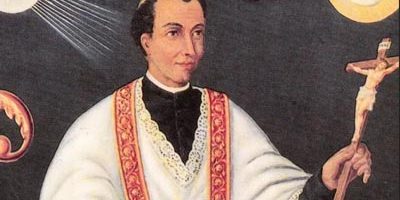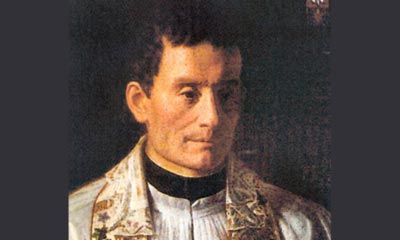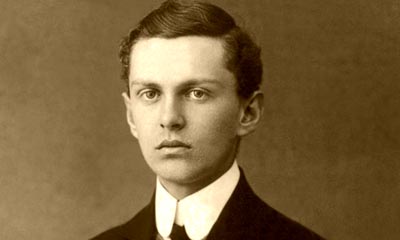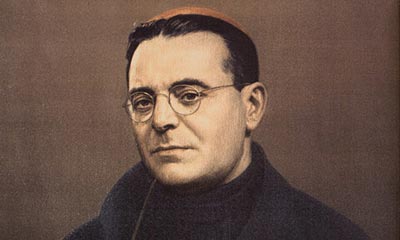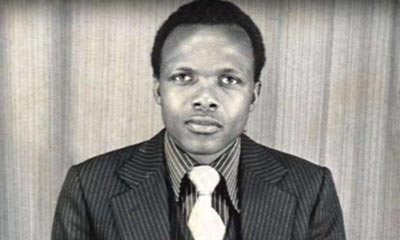January 25, 2022
Saint Joseph Vaz
Dear Friends,
“Father Joseph Vaz,” said St. John Paul II on January 21, 1995, “was a great missionary priest, belonging to the unending line of ardent heralds of the Gospel, missionaries who, in every age, have left their own land to bring the light of the Faith to peoples not their own… Father Vaz was a worthy heir of St. Francis Xavier; he was also a true son of his native Goa, outstanding for its deep Christian and missionary traditions. Father Vaz was a son of Asia who became a missionary in Asia. The Church today needs more such missionary men and women among the different continents” (Homily for the Mass of Beatification).
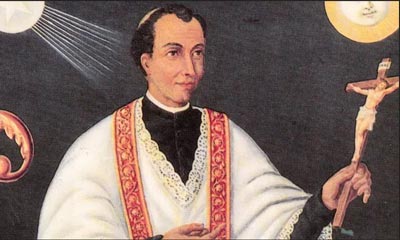 The third of six children, Joseph was born on April 21, 1651 in Benaulim, in the province of Goa in India, which was at the time a Portuguese possession. His parents were devout Catholics; both were of Brahmin origin, the highest caste. The child was given the name of Joseph when he was baptized eight days after his birth. During his school years, he learned Portuguese and then Latin. His family was struck by his spirit of mortification, especially with regard to food. If he heard some poor beggar asking for alms at mealtime, he would hasten to give him his own share, while trying to hide his gesture from his parents. He would often withdraw into private prayer, and very early on, he expressed his desire to become a priest. Delighted by this early vocation, his father sent him to the Jesuit College of St. Paul in Goa, and then to the Dominican Academy of St. Thomas Aquinas, to study philosophy and theology as a seminarian. Joseph was highly commended by his examiners. The Archbishop of Goa ordained him a priest in 1676. Before long, Joseph adopted the habit of walking barefoot and living like the poor. In 1677 he consecrated himself as a “slave of Mary.”
The third of six children, Joseph was born on April 21, 1651 in Benaulim, in the province of Goa in India, which was at the time a Portuguese possession. His parents were devout Catholics; both were of Brahmin origin, the highest caste. The child was given the name of Joseph when he was baptized eight days after his birth. During his school years, he learned Portuguese and then Latin. His family was struck by his spirit of mortification, especially with regard to food. If he heard some poor beggar asking for alms at mealtime, he would hasten to give him his own share, while trying to hide his gesture from his parents. He would often withdraw into private prayer, and very early on, he expressed his desire to become a priest. Delighted by this early vocation, his father sent him to the Jesuit College of St. Paul in Goa, and then to the Dominican Academy of St. Thomas Aquinas, to study philosophy and theology as a seminarian. Joseph was highly commended by his examiners. The Archbishop of Goa ordained him a priest in 1676. Before long, Joseph adopted the habit of walking barefoot and living like the poor. In 1677 he consecrated himself as a “slave of Mary.”
A mysterious light
Father Vaz desired to go to the island of Ceylon (now known as Sri Lanka) as a missionary, but his superiors, judging the situation on the island to be too delicate and even perilous, sent him to Canara, in southeastern India, where there was a conflict between the “Padroado” (the Portuguese administration) and the ecclesiastical authorities appointed by Rome. Joseph received his mission orders from the Padroado; he was to replace a priest who refused to accept the presence of a vicar apostolic, Bishop Thomas de Castro, who had been appointed in 1675 by Pope Clement. As a consequence, a rift had developed between the supporters of the bishop and those of the Portuguese authorities. But before long, a new Pope, Innocent XI, confirmed Bishop de Castro in his office. Joseph recognized his authority, while also taking care not to give rise to conflict with the Portuguese Padroado. Bishop de Castro gave him the necessary powers to exercise his apostolate. For four years, Father Vaz spent every effort to revive the faith, prepare the faithful for the sacraments and rebuild churches. He founded small schools and numerous confraternities that brought together Catholics who lived in places without permanent missionaries or a church. He put himself at the service of those who were considered to be the least in society. Since the Christians were so very dispersed, our missionary had to travel long distances to visit them: everywhere he gave instruction, put an end to disputes, administered the sacraments and taught the faithful how to baptize. The care he offered to sick pagans was the cause of many conversions. However, in the course of this fruitful ministry, Joseph received many insults. One day, a group of pagans beat him up, but he remained silent. For their part, the Hindus were annoyed by the missionary’s intense activity and by the scope of his achievements. They lured him to a deserted spot under the pretext of ministering to a dying man. Having sensed their plans, the Father knelt down to pray. A bright light appeared and water sprang up all around him to protect him. The aggressors were frightened, and fled. A shrine has since been erected at this location.
Upon his return to Goa in 1684, the Father joined a group of priests who had decided to set up a form of common life. On September 25, 1685, he organized the group according to the spirit of the Oratory of St. Philip Neri, thus constituting the first indigenous religious community in the diocese. The Oratory, founded in Rome by St. Philip Neri in the 16th century, is a society of secular priests who, without being bound by vows, live in common with the aim of working for their own sanctification and that of their neighbors through preaching and teaching. Father Vaz was elected as the first superior; he preached not only by his words, but also by his whole way of being. He spoke often and with deep emotion about the Passion and about hell.
St. John Paul II would later explain: “God gives his only-begotten Son so that man ‘should not perish’ and the meaning of these words ‘should not perish’ is precisely specified by the words that follow: ‘but have eternal life.’ Man ‘perishes’ when he loses ‘eternal life.’ The opposite of salvation is not, therefore, only temporal suffering, any kind of suffering, but the definitive suffering: the loss of eternal life, being rejected by God, damnation. The only-begotten Son was given to humanity primarily to protect man against this definitive evil and against definitive suffering” (Encyclical Salvifici doloris, February 11, 1984, no. 14).
Moved by the Father’s preaching, many pagans converted and reformed their ways. But he soon resigned as superior and obtained permission to leave for the island of Ceylon where the Catholics were completely abandoned in the midst of a Buddhist country. In 1658, the Dutch, who favored the Dutch Reformed Church and feared that the Catholics would support the Portuguese, had begun to persecute them and to prohibit the practice of the Catholic faith. One hundred and twenty Catholic missionaries had been forced to leave Ceylon. The desire to go and save the Church of Ceylon burned in the heart of Father Vaz.
The most complete answer
The Catholic Church “exists to proclaim that the fullest answer to life’s questions is found in Jesus Christ, the Incarnate Word of God. He is the Eternal Word of the Father and the New Adam. Through him all things were made and in him all people find that light which is the life of the world. Christ, by revealing the mystery of the Father and his Love, fully reveals man to himself and makes clear his sublime calling. For this reason, the Church never ceases to proclaim that Jesus Christ is the way, and the truth, and the life (Jn. 14:6), the One in whom the fulness of religious life is found and in whom God has reconciled all things to Himself. Father Joseph Vaz came to this land in order to proclaim this same message. He preached the name of Christ out of obedience to the Truth and out of a desire to share with others the way that leads to eternal life” (John Paul II, January 21, 1995).
In 1687, accompanied by a Christian named John, and disguised as a beggar, Joseph reached Jaffna. He would beg with a rosary around his neck, and thus made contact with the Catholics. The Catholics, fearing that his presence would eventually be discovered, decided to move him to a nearby village, where they were strong both in numbers and in courage. This village had escaped the surveillance of the Dutch. The Father comforted these Christians and stayed with them for two years, also visiting the neighboring villages at night, under escort. But the Dutch commander of Jaffna observed the revival of Catholic life in his district, and located the priest’s presence. Three hundred Christians were imprisoned, but Joseph Vaz managed to escape to Puttalam, in the domain of the King of Kandy, in the hinterlands of Ceylon, where the Dutch had hardly penetrated. For a year, he carried out his missionary work there with success. He went from village to village, preaching, administering the sacraments, rebuilding churches and instituting catechists. After eighteen months, a merchant obtained permission from the king to go to the capital, Kandy. There, a violently anti-Catholic Frenchman denounced him as a Portuguese spy, and the king ordered that the priest should be imprisoned together with John. Joseph, who had already studied Tamil, took advantage of his imprisonment to learn the local language, Singhalese. Soon, the harmless behavior of Joseph and John moved the king to soften their fate, but they were still kept under surveillance. The Father set up a small oratory and, on Christmas night, celebrated Mass for the first time in Kandy. Little by little, the Catholics obtained permission from the king to attend Mass and to ask Joseph for the sacraments. Eventually, the sovereign authorized the missionary to leave his place of residence, on condition that he never cross the river that surrounded the city. The Father defied the ban, however, when he was called to assist a sick person. The government officials did not denounce him, because they considered him to be a holy man.
A living icon
“First, he was an exemplary priest,” Pope Francis remarked about St Joseph Vaz. “He teaches us how to go out to the peripheries, to make Jesus Christ everywhere known and loved. He is also an example of patient suffering in the cause of the Gospel, an example of obedience to our superiors, an example of loving care for the Church of God. Like ourselves, St. Joseph Vaz lived in a period of rapid and profound transformation; Catholics were a minority, and often divided within; there was occasional hostility, even persecution, from without. And yet, because he was constantly united with the crucified Lord in prayer, he could become for all people a living icon of God’s mercy and reconciling love” (Homily for the Canonization, January 14, 2015).
In 1696, there was a prolonged drought in Kandy. The king asked the Buddhist leaders to perform their ceremonies to obtain rain, but to no avail. He then sent some members of his court who were Catholics to ask the Father to pray for the same intention. Joseph set up an altar in the public square, put a cross on it, knelt down and prayed that God glorify His own name by sending rain. Even before he could rise to his feet, the rain began to pour. In his gratitude, the king granted the missionary great freedom and privileges that no one else had obtained before. Many conversions followed. Joseph sent his faithful John to Goa to explain the urgent need for more priests, and went on to visit the Catholic villages in the neighboring kingdoms that were under the control of Kandy. But his zeal drove him to penetrate the part of the island that was under Dutch rule; discreetly, he went to Colombo, the capital of the Dutch. There he brought several Protestants back to the true faith, and reconciled sworn enemies. Informed of his presence, the governor of the city ordered his immediate arrest, but Father succeeded in leaving, and travelled to several villages where there were Catholics; he strove, not without difficulty, to re-establish good morals among them, before returning to Kandy. Three missionaries from the Oratory of Goa came to join him and told him that the bishop had appointed him vicar general for Ceylon. He accepted the position and set out to improve the organization of the mission.
Selfless dedication
A violent smallpox epidemic broke out in Kandy at the time. The first patients were carried out of the city and abandoned. Joseph and his companions set out to find them and settled them in huts, looking after them with diligence. The growing numbers of the sick pushed the king and his court to leave the city; a general exodus followed. Father Vaz went from house to house to care for the abandoned, or to transport them to buildings he rented near the church. At the news of such generosity, many victims flocked to the mission, knowing that the missionaries were giving care to everyone, regardless of race or religion. This example stirred up the Christians to practice their faith openly. Many conversions took place. At the height of the epidemic, ten to twelve people died every day in Jaffna. The priests themselves dug the graves. The scourge lasted twelve months, but the Fathers did not succumb despite so much fatigue. Some pagans and apostate Christians tried to slander them before the king, claiming that they were acting out of human ambition; but the sovereign, who was well informed about their unselfish devotion, publicly declared that without them the streets of the city would have been clogged with corpses.
Father Vaz, accompanied by other priests, then proclaimed the Gospel in the island. He returned to Kandy in 1699 with Father Joseph de Carvalho, who had been expelled from another region by Buddhist monks. He completed the construction of a new church and put himself at the service of the king in order to translate certain Portuguese writings into Singhalese. In 1705, now joined by other priests, he organized the mission into eight districts. He published works of piety in the local language and defended the rights of Catholics in those areas where Protestants or Buddhists were dominant. In 1703, Pope Clement XI considered appointing him bishop and vicar apostolic of Ceylon: preferring to remain a simple missionary, the Father declined the offer. Once again, he set out on an itinerant mission, beginning with the Dutch city of Hanwella, where there was a solid Christian population composed of Portuguese and local converts. He moved on to Colombo and then to Gurubevel. The local police tracked him down and tried to arrest him in the house where he was staying: they submitted all those present to their scrutiny but did not recognize him. He visited other Christian communities before returning to Kandy where a young nobleman from the kingdom was waiting for him to be instructed in the faith. Thanks to his work, the west coast of Ceylon, where there was a strong presence of Dutch Protestants, became the most Catholic part of the island.
Going forth
“St. Joseph gives us an example of missionary zeal. Though he came to Ceylon to minister to the Catholic community, in his evangelical charity he reached out to everyone. Leaving behind his home, his family, the comfort of his familiar surroundings, he responded to the call to go forth, to speak of Christ wherever he was led. St. Joseph knew how to offer the truth and the beauty of the Gospel in a multi-religious context, with respect, dedication, perseverance and humility. This is also the way for the followers of Jesus today. We are called to go forth with the same zeal, the same courage, of St. Joseph, but also with his sensitivity, his reverence for others, his desire to share with them that word of grace which has the power to build them up. We are called to be missionary disciples” (Pope Francis, ibid.).
But in the absence of the Father, a powerful conspiracy against him was forming in Kandy. The hospital he had built during the epidemic was destroyed. The priests of the idols complained that the constant growth of the Church was prejudicial to them. The decline of the worship of Buddha, it was insinuated to the king, was jeopardizing his sovereignty. The king was overly attached to his personal tranquility, and he had Father Carvalho expelled. The enemies of the faith promptly began to persecute the Christians. Upon hearing of these events, Father Vaz immediately set out for the capital, regardless of numerous warnings to the contrary. Before going to the king’s house, he celebrated Mass and set the Christians to praying. The king’s physician, a pagan of considerable uprightness and with great influence on the sovereign, offered his services as an intermediary. In less than an hour, this doctor convinced the king of the innocence of the missionaries and obtained for them even more extensive permissions than before.
In the first year of his presence in Kandy, Father had converted the son of the bursar general of the kingdom, and had advised him not to make his conversion public for some time, lest social unrest should ensue. The young lord, who had not yet been baptized, went to live in a faraway city and, finding no support there, lapsed into licentiousness. He became involved with an idolatrous woman with whom he had children. But God spoke to this man in a dream, and he returned wholeheartedly to the faith. When he returned to Kandy, he presented himself as a catechumen to a priest who did not know him. This priest warned him that he must separate from his lover. He accepted; however, before sending her away, he sought to catechize her and her parents. So doing, he obtained the conversion of forty people whom the Father himself baptized. The young man and the woman were then married. In their fury, the pagans claimed that the baptisms had been performed with the blood of cows, the sacred animal of the Hindus, mixed with water. Thus misled, the king imposed severe punishments; but when he finally recognized that this was yet another piece of slander, all sanctions were lifted.
Walking on the water
Father Vaz went to Puttalam to welcome two new missionaries who had been sent there from Goa. Upon arriving at a rising river, on the banks of which several merchants were waiting for the waters to recede so that they could cross, the Father began to pray and then, with his staff in hand, stepped into the swift waters, inviting his companions to follow him; the merchants looked on, scoffing at the scene. The priest stopped in the middle of the river without mishap, and invited his companions to cross to the other side unafraid. All were able to pass. Near Batticaloa, a village under Dutch rule that he visited in 1710, Father was captured by pagans, tied to a tree and beaten. This mistreatment did not prevent him from visiting the village a second time. When he left one place for another, he would celebrate Mass before dawn and then recite the Office of the Dead. If a cross had been erected in the village, he venerated it and then set out. His devotion impressed all those who observed it, Christians and pagans alike. Whenever possible, he took care to have someone accompany him on his journeys, and he always carried a supply of rice to give to the poor that he encountered.
When King Vimaldharna Surya II died in 1707, his successor, Vira Narendra Sinha, proved even more favorable to Catholic missions. Despite his poor health, the Father made another missionary journey in 1710. On his return, he was struck down by tropical fever; he made a partial recovery, but remained very weak. He now lived in seclusion, but still visited some of the sick, leaning on a cane; in church, he would preach sitting on a chair. On his way back from visiting a dying man, the car carrying him overturned and the Father was injured, and for a moment became unconscious. He continued, however, to draw courage from the contemplation of the Passion of Our Lord. In spite of his weakened state and severe pain, he followed the eight-day retreat prescribed by the rules of the Oratory. As his condition worsened, he received the last sacraments with deep devotion.
At the request of his confreres, he pronounced the following words in Singhalese, by way of a testament: “It will be very difficult for you to do at the hour of death what you did not do in life.” He responded with a clear voice to the prayers for the dying, and then invoked the Holy Name of Jesus; great joy spread over his face and he died peacefully on January 16, 1711, at the age of fifty-nine. The Father’s legacy consisted of 70,000 Catholics, 15 churches and 400 chapels. His example and his methods of apostolic work have made him a permanent source of inspiration for priests in Sri Lanka.
“Blessed Joseph should inspire you to be tireless and spirit-filled witnesses to the Gospel in your families and in your communities. In Baptism you were remade in the likeness of Christ and given a mission to proclaim prophetically his presence in the world. In Confirmation you were strengthened by the Holy Spirit and sent forth to profess your faith in word and deed… Like Joseph Vaz, who freely shared the truth he had received, everyone who has received the gift of faith is called to share that gift with others.” These words of St. John Paul II to the Christians of Sri Lanka urge us all to bear witness to the truth of the faith, in word and deed.


